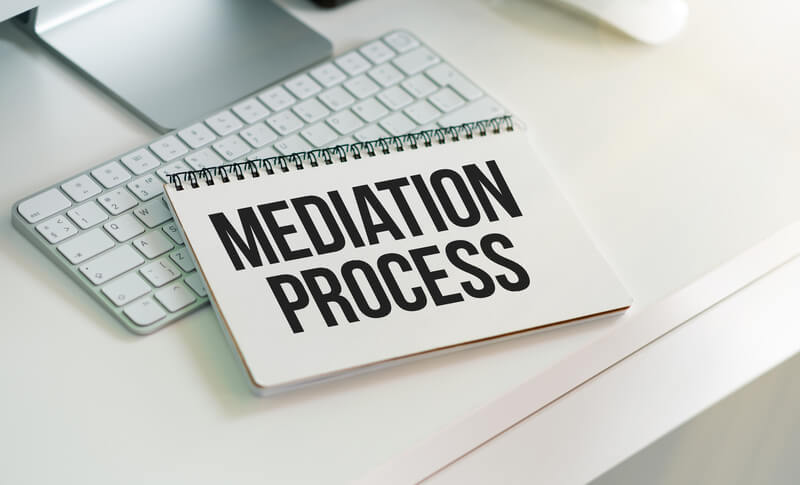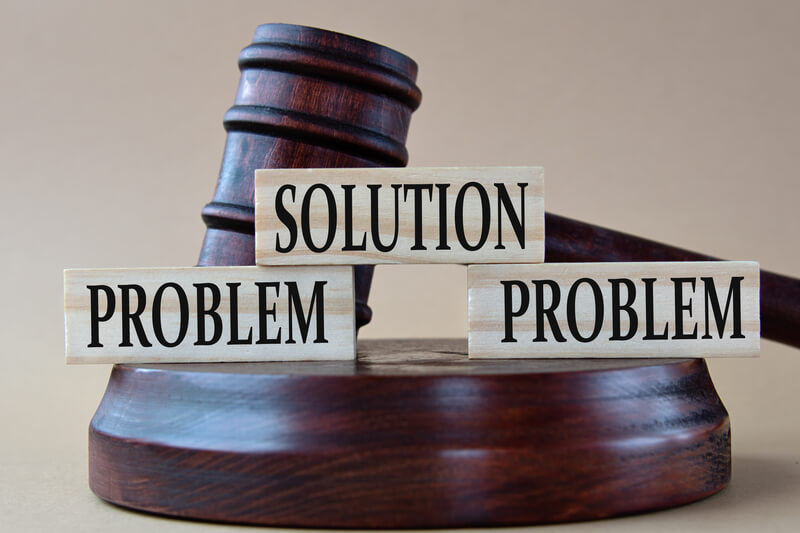Divorce is a complex process that involves ending a marriage’s legal contract. It also has a vital emotional component, frequently resulting in significant disagreements. Even the most well-intentioned couples can find it challenging to divorce amicably.
Couples can use alternative dispute resolution (ADR) options like mediation during their divorce. Your divorce may be unique to you and your situation, and whether mediation is the ideal choice depends on various factors. Knowing the pros and cons of divorce mediation can help you choose the best course of action.
At PRO LAW GROUP, divorce lawyer Donn W. Prokopius is here to assist you in making well-informed choices that protect your financial and parental rights. Call (702) 474-0500 to reach Donn W. Prokopius.

What Is Divorce Mediation?
In an informal setting, couples meet with a professional, neutral mediator during divorce mediation. Although sessions are frequently held in the mediator’s office, there are several ways to participate in virtual (or “online”) mediation. Whatever it is, the mediator assists the spouses in resolving their issues, including, among others, child support as well as how to divide property, and records the agreement.
A couple may request an uncontested divorce from the court after preparing a settlement agreement. Since everything has been prearranged, the court frequently expedites uncontested cases; judges can frequently complete the divorce within a few months.
The Pros of Divorce Mediation
Try mediation before entrusting your case to lawyers if you and your spouse cannot complete a DIY divorce due to unresolved issues or need assistance with the paperwork.
Assistance in Navigating the Issues
You have options for a speedy and affordable divorce, including an online divorce service, when you and your spouse are on the same page. However, most online divorce services cannot assist in your case if you and your spouse have problems you can’t resolve.
Additionally, the more complicated your situation is—for instance, if you have a child with special needs or a lot of assets—the more probable it is that you and your spouse will seek help addressing the problems. A skilled mediator can help you identify the specifics you need to solve, outline potential solutions that work with other couples, and assist you with the necessary paperwork.
Greater Control Over The Outcome
Instead of letting a judge decide what will happen to you, your assets, and your children, mediation largely puts the future in your hands. No one knows your circumstances better than yourself and your spouse. You may control the outcome of your divorce on your very own terms with the aid of mediation.
Judges frequently have a heavy caseload, leaving little time to evaluate each matter before them fully. You get to delve deeply into the problems and develop original solutions through mediation. Through mediation, a couple, for instance, might devise an arrangement to keep the family home until the children are out of school or where the children reside in the home while the parents travel in and out.
Faster Divorce Resolution
Another advantage of mediation involves time. When you employ attorneys and go to court, the proceedings go glacially slowly. One of only a few number of family court judges will be assigned to your case out of thousands. Contrarily, the pace of mediation can be decided upon by you, your spouse, as well as the divorce mediator.
Significant Cost Savings
You’ll likely need a lawyer to assist you in getting the desired result if you file for divorce before settling problems like child custody, child support, distribution of marital property, and alimony (spousal support). Attorney expenses quickly mount up when so many problems need to be fixed. And those fees go up faster the more disputes there are.
In most mediations, the mediator’s fee is divided between the partners. Therefore, there is a good chance that you will pay significantly less than if you went to court, regardless of whether the mediator serves as an attorney or another expert educated in mediation (like an accountant or psychologist). You can also hire a lawyer to represent you in the mediation if the thought of doing so seems intimidating.
Be aware that there are circumstances where divorcing partners may want assistance from other professionals in the mediation process. For example, you may want an appraiser to determine the value of your property or a social worker or psychologist to assist you in resolving child custody and visitation difficulties. But if you forego mediation and go to court instead, you would still require help from those professionals. In all likelihood, you will be paying them even more, since you will be paying for their testimony in court, the preparation of a written report, in addition to the consultation fee.
Control Over Your Schedule
When you go to court, you’ll have no control over scheduling—the court will inform you when you’ll have to appear, with no respect for your schedule or past commitments. Additionally, it’s not uncommon to show up for a courtroom hearing or conference and wait for hours before the judge is ready to hear you. You, as well as your spouse, decide the times and dates of your mediation session. Some mediators also provide evening sessions, significantly benefiting partners working throughout the day.
A Good Start for Your Post-Divorce Relationship
You and your spouse may end up on better terms after the mediation than if you and your spouse had fought for a year or more in a courthouse. Even after the divorce is finalized, court fights can leave behind lingering hate and anger that is nearly impossible to overcome. That will have a bad impact on you and your kids.
With the help of mediation, couples can establish a better relationship and navigate future co-parenting more smoothly. Lengthy research found that parents who don’t reside with their children saw them more frequently after mediation than after filing for divorce in court.
The Cons of Divorce Mediation
Even though divorce mediation may be effective, it might only be for some. Think about these potential cons.
You Will Not Have Someone Negotiating On Your Behalf
Mediation is an excellent choice for people who feel comfortable resolving and discussing legal issues without pursuing legal counsel. While qualified divorce mediators know the relevant laws and can draft negotiations outlining your and your partner’s agreements, they cannot give legal advice. (Many skilled divorce mediators aren’t attorneys; they may be any number of professionals, like social workers, therapists, or psychologists.)
Attorneys may participate in mediation with some mediators. Others advise against having a lawyer there because they worry their presence may tip the scales in the discussions, mainly if only one spouse is represented. Additionally, if both spouses bring lawyers, it may appear hostile.
Consider speaking with a lawyer outside of your mediation sessions if you wish to proceed through mediation, but also receive legal advice. Both parties can do this after the procedure or after each session.
Mediation Costs More Than DIY Divorce
Consider the mediation cost versus a DIY divorce if you wish to maintain the expenses to a minimum. But with a DIY divorce, you’ll need to handle the divorce process on your own and become familiar with the laws and practices of the court.
And you might only be satisfied with your DIY settlement if the two of you are totally in accord and your divorce only involves ending the marriage. If you agree with anything you agree with, you might later come to regret it. For instance, you might decide how to divide a significant pension or piece of real estate or decide on an alimony payment, only to find out later that you underestimated the legal and financial consequences.
Mediation Is Not Suitable For Couples Who Have A Power Imbalance
Fairness is essential for a mediation to be successful. If one spouse holds the upper hand over the other in any way, mediation may not succeed. For instance, a bully spouse accustomed to “winning” may never agree to settle. Alternatively, a partner who has been the victim of domestic violence can be too hesitant to speak up during a mediation session. (Continued domestic violence and other dangerous situations essentially disqualify mediation and indicate that the potential or current victim requires professional help.)
The success of mediation is also less likely when one spouse has a track record of lying or being unreliable. That is mainly true if one spouse is presumed to be concealing assets or misusing money. Only if both spouses are thoroughly honest with each other about all the issues at hand, including all they own, can a meaningful settlement be reached.
Additionally, the other spouse usually needs legal representation if one spouse claims legally that the other spouse is to blame for the divorce or has already retained an attorney.
Legal Implications of Divorce Mediation
Some key legal considerations related to divorce mediation:
- Voluntary Participation: Divorce mediation requires the voluntary participation of both parties. It means that both individuals must be willing to engage in the mediation process to resolve their disputes. If one party refuses to participate or does not engage in good faith, alternative methods like litigation may need to be pursued.
- Confidentiality: Mediation sessions are generally confidential, creating a safe and private discussion environment. This confidentiality fosters open communication and allows parties to express their concerns and interests freely. However, exceptions to confidentiality may exist in cases involving potential harm to oneself or others.
- Legal Advice: While mediators can provide general information about the law, they cannot offer legal advice to either party. Each other must seek independent legal counsel to receive personalized advice and protect their rights and interests during mediation.
- Binding Nature of Agreements: Agreements reached through mediation are typically documented in a mediated settlement agreement or memorandum of understanding. Once approved by the court, these agreements become legally binding and enforceable. They outline the terms and conditions agreed upon by the parties regarding child custody, asset division, spousal support, and other important aspects of the divorce.
- Court Approval: While mediation facilitates agreement between the parties, the court issues the final divorce decree. The mediated settlement agreement must be presented to the court for review and approval. The court ensures the agreement is fair, complies with relevant laws, and serves the children’s best interests. Once approved, the court incorporates the terms into the final divorce decree.
It is crucial for individuals considering divorce mediation to understand the legal implications involved and to consult with their legal counsel to ensure their rights and interests are protected throughout the process.
Tips for Successful Divorce Mediation
Divorce mediation can be a highly effective and less adversarial alternative to resolving conflicts during a divorce and allowing couples to work together with a neutral third party to reach mutually acceptable agreements.
Here are some tips for successful divorce mediation:
- Choose the right mediator: Select a qualified, experienced mediator specializing in divorce mediation. Look for someone who is impartial, neutral, and has a track record of successfully resolving disputes. The mediator should be skilled in facilitating communication and guiding the process.
- Prepare in advance: Before the mediation sessions, gather all relevant documents related to your financial situation, assets, liabilities, and other pertinent information. That will help you make informed decisions and provide a basis for negotiation.
- Maintain open communication: Effective communication is crucial during mediation. Listen actively to your spouse’s concerns and perspectives, and express your thoughts and feelings respectfully. Keep the lines of communication open and be willing to compromise.
- Be flexible and open to compromise: Mediation requires a willingness to compromise. Recognize that you may not get everything you want, but aim for fair and equitable outcomes. Be open to creative solutions that can address both parties’ needs.
- Seek professional guidance when needed: Although mediation is designed to be a self-guided process, it can be beneficial to consult with professionals such as attorneys, financial advisors, or therapists to ensure you are making informed decisions. Their expertise can provide valuable insights and guidance.
Remember, divorce mediation requires cooperation and willingness from both parties. If you have problems with your divorce and want to talk to a Las Vegas divorce lawyer, Donn W. Prokopius is here for you.
Conclusion: Divorce Mediation
You can suggest mediation to your spouse if, after assessing the pros and cons, you believe it would be a suitable fit for your divorce. You must consent to the mediation process and the mediator to move further.
On the other hand, be aware that you are only obligated to mediate once the court demands it. And if you’re hesitant, it might be worthwhile to spend the time and money to consult with a family law attorney to go over the particulars of your case, determine whether mediation is a reasonable option for your divorce, and determine if you may benefit from having a lawyer by your side during mediation.
Consult with an Experienced Family Law Attorney Today
It may or might not be a smart choice for yourself and your situation if you consider going to mediation to avoid court and minimize your divorce losses. However, the skilled family law attorneys at PRO LAW GROUP are ready to assist you in weighing the advantages and disadvantages of divorce mediation and determining the right course of action for you.
Call our divorce attorney on the phone at (702) 474-0500 for questions and more details.


